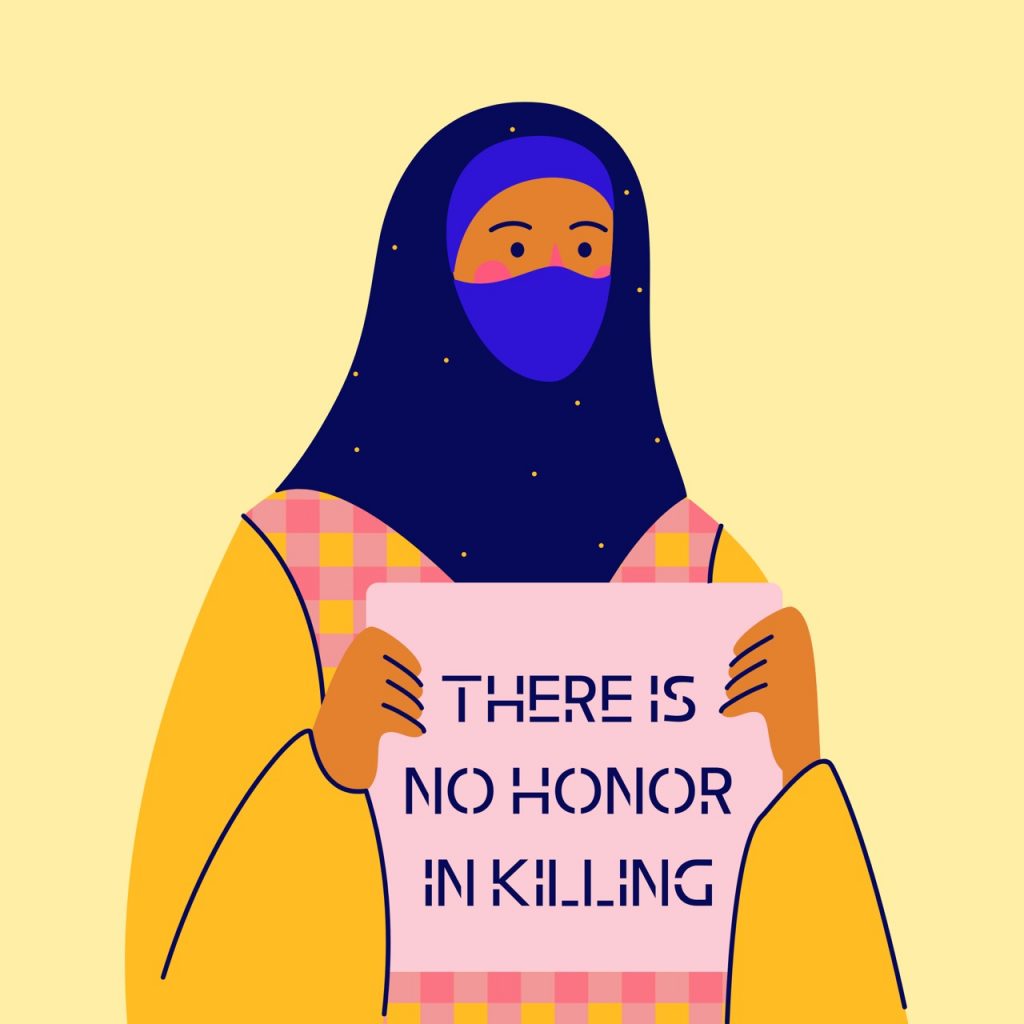
By: Fay AlAdwan, Credit: The Myriad News
Fay AlAdwan explains the cultural practice of honor killings in many Arab countries and the context behind its disturbing reasoning, in English and Arabic.
[English version]
A video on social media shows a father murdering his daughter
During the end of July, a video circulated on social media where a woman’s screams could be heard. Those screams belonged to Ahlam, a 30-year-old woman, as she was being beaten and then bludgeoned by her own father. The neighbors could not help her. Ahlam died, and her father drank a cup of tea and smoked a cigarette by her corpse.
When murders like this happen, the first question asked is this: what did the victim do? Surely, she must’ve done something to provoke her poor father, right? After all, the father is only trying to protect the family’s honor.
What are honor killings?
Honor killings are a global phenomenon, where—usually—a woman or a girl is murdered by a male family member due to a disapproval of her actions. The belief is the woman’s death will purge the family of the shame she brought to them. Though this may seem like a religious tradition, it is a cultural phenomenon.
The term “honor killing” itself is a way for the perpetrator to justify his actions by placing the blame on the victim, and as a result, a way to avoid prosecution. This justification leads to the governments’ negligence. In many Arab countries, some cases are deemed honor killings when it could have just been a heated argument that led to physical violence and was taken too far, leading to a woman’s death.
The law is lenient in Jordan
Article 98 of Jordan’s penal code, the “Fit of Fury” defense, allows perpetrators to blame their actions on rage stemming from the victims actions, once again justifying crimes by blaming victims. Article 99 allows the family of the victim to drop charges or forgive the murderer, cutting the sentence in half, and usually, the victim’s family is also the murderer’s family. Laws should act as deterrents for people, but instead it justifies their actions.
Violence rates remain unchanged
The number of honor killings a year in Jordan has decreased over the past two decades, which is a sign of change. However, the rate of overall violence against women remains unchanged. Discrimination, which is the base of such violence, has almost become normalized, as women have to follow a certain standard of behavior.
Of course, some people still believe that some victims deserve what they get, but the majority of people in Jordan are angered by such cases and stand for change. They’ve taken to social media to express their disapproval and demand change, as well as starting petitions and even protesting.
The system in Jordan needs improvement, from the laws to the social attitude. Hopefully, the outrage will finally spur the country to take steps towards changing the legislation related to punishments to support women.
[النسخة العربية]
في النصف الاخير من شهر تموز، تم تداول فيديو على مواقع التواصل الاجتماعي لصوت صرخات امرأة، (صرخات أحلام) امرأة ثلاثينية، قتلت على يد والدها، الذي جلس بجانب جثتها ليشرب الشاي و يدخن.
عند حدوث مثل هذه الجرائم، يكون أول سؤال يطرح هو ما الخطأ الذي ارتكبته الضحية؟ ما الذي فعلته حتى استثار والدها ليقتلها، لأن الأب في هذه الحالة لا يهمه شيء سوى حماية شرف العائلة.
جرائم الشرف هي ظاهرة عالمية، حيث يقوم أحد أفراد الأسرة الذكور بقتل امرأة من عائلته لعدم رضاه عن أفعالها، ظنا منه أن موتها سيطهر العائلة من العار الذي جلبته لهم. قد تبدو هذه الظاهرة أنها مرتبطة بتقليد ديني، إلا أنها مجرد ظاهرة مجتمعية ثقافية. مصطلح “جرائم الشرف” في حد ذاته هو وسيلة ليبرر مرتكب الجريمة أفعاله من خلال إلقاء اللوم على الضحية، وبالتالي يتجنب المحاكمة. هذا التبرير يؤدي إلى تهاون وتقصير من الحكومة.
في العديد من البلدان العربية، تُعتبر بعض القضايا “جرائم شرف” عندما كان من الممكن أن تكون مجرد شجار أدى إلى عنف أودى بحياة امرأة. المادة 98 من قانون العقوبات الأردني تبرر لمرتكبي الجرائم جرائمهم من خلال إلقاء اللوم على غضب المجرمين الناجم عن أفعال الضحية. تسمح المادة 99 لعائلة الضحية بإسقاط التهم أو العفو عن القاتل، مما يقلل العقوبة إلى النصف، وعادة ما تكون عائلة الضحية هي أيضًا عائلة القاتل. يجب أن تعمل القوانين كرادع للناس، لكنها تبرر أفعالهم بدلاً من ذلك.
انخفض عدد جرائم الشرف سنويًا في الأردن على مدار العقدين الماضيين، مما يدل على التغيير. ومع ذلك، معدل العنف ضد المرأة لم يتغير. أصبح التمييز، الذي هو أساس هذا العنف، أمرًا طبيعيًا في مجتمعنا، حيث يتوجب على النساء اتباع سلوكيات معينة. طبعا، لا يزال بعض الناس يعتقدون أن بعض الضحايا يستحقون ما حل بهم، لكن غالبية الناس في الأردن غير راضين عن مثل هذه الحالات يطالبون بالتغيير. لقد استخدموا وسائل التواصل الاجتماعي للتعبير عن رفضهم والمطالبة بالتغيير، وكذلك توقيع عرائض وحتى الاحتجاج.
يحتاج النظام في الأردن إلى التحسين، من القوانين إلى الفكر المجتمعي. نأمل أن يدفع رد الفعل حول هذه الجريمة الدولة إلى اتخاذ خطوات نحو تغيير التشريعات المتعلقة بالعقوبات لتدعم حقوق المرأة.
